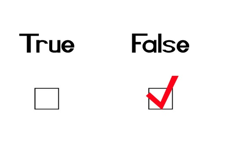 The reason employees lie is they do not want to cause or get into trouble. In some cases, employee lying is to cover for another employee's lie. In other cases, they lie to cover for themselves.
The reason employees lie is they do not want to cause or get into trouble. In some cases, employee lying is to cover for another employee's lie. In other cases, they lie to cover for themselves.
Lying About Being Sick, Biggest Lie
If you were to keep count, employees lying about being sick to take sick time is far and away the number one lie.
To make it difficult for an employee to do this, some employers require a note from a doctor if the employee is out more than one day, or on a Friday and a Monday. Other companies follow the Family Leave and Medical Act and require a doctor's note after three consecutive days of absence due to illness.
Companies with PTO programs separated from paid sick time may encourage lying as employees try to keep what they see as theirs - paid time off.
Of course, this creates a filing nightmare or extra work scanning the note into an electronic employee personnel record.
 Manager Time Lost Playing Detective
Manager Time Lost Playing Detective
Some human resource managers, who suspect that employees are abusing sick leave and lying on the job to cover themselves go to elaborate lengths to stop them. They track sick time off patterns, check Facebook and other social media to see "what they were really doing."
The reason for the great lengths folks go to when they think someone lied to them is that when someone lies to you it is insulting.
 PTO offers Hope
PTO offers Hope
While ending employee lying is as likely as children not fibbing, employers can do things to reduce it. At least they can as far as sick time lying goes.
If you do not have a Paid Time Off program, start one without segregating sick time. If you do have a PTO system with segregated sick time, roll the sick time into the total days paid for that an employee can take.
However, there is a potential downside to this type of PTO program. Employees look at their total PTO as time due to them and may come to work sick. This is a drain on their productivity and that of the entire office or workplace if they are contagious.
Another negative is that employees who never used all their sick time before PTO implementation are surely going to use it once PTO begins. This means employees are gone more often than before. One control is to only pay for PTO when it has prior authorization. You can make exceptions for absence due to illness, but can limit the amount of days.
Paid Time Off is not primarily to prevent your staff from lying. But it is the wave of the future with nearly half of all companies reporting they have implemented a PTO with or without including sick time in their program.





